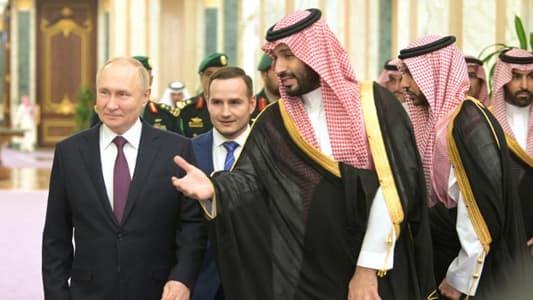Russian President Vladimir Putin and Saudi Crown Prince Mohammed bin Salman called on Thursday for all OPEC+ members to join an agreement on oil output cuts, saying they were for the good of producers and the broader global economy.
Putin held a hastily-arranged meeting in Riyadh with the Saudi crown prince on Wednesday after a pledge by OPEC+, which groups the Organization of the Petroleum Exporting Countries (OPEC) and allies led by Russia, to further cut output.
Hours after Putin's face-to-face talks with the Saudi crown prince, known as MbS, the Kremlin released a joint statement detailing wide-ranging talks between them on oil, OPEC+, the wars in Gaza and Ukraine and even Iran's nuclear programme.
"In the field of energy, the two sides commended the close cooperation between them and the successful efforts of the OPEC+ countries in enhancing the stability of global oil markets," the statement released by the Kremlin said.
Saudi Arabia and Russia are the world's biggest oil exporters.
"They stressed the importance of continuing this cooperation, and the need for all participating countries to join to the OPEC+ agreement, in a way that serves the interests of producers and consumers and supports the growth of the global economy," the statement, which was in Russian, added.
The Russian version used the word "join" while an English translation of the statement, also released by the Kremlin, used the word "adhere" to the OPEC+ agreement.
The total curbs amount to 2.2 million bpd from eight producers, OPEC said in a statement after last week's meeting. But not all OPEC+ members agreed to extend or deepen the voluntary oil cuts.
After the OPEC+ meeting, Saudi Arabia agreed to extend voluntary oil output cuts of 1 million barrels per day (bpd) into the first quarter, while Russia said it would continue to curb oil exports by 300,000 bpd and additionally reduce its fuel exports by 200,000 bpd in January - March.
OPEC was founded in 1960 by Iraq, Iran, Kuwait, Saudi Arabia, and Venezuela and expanded to 13 members. In 2016, OPEC signed an agreement with 10 other oil producers, including Russia, to create OPEC+.
Russia and Saudi have coordinated supply cuts - both as part of OPEC+ and with side agreements - to support oil prices in recent years.










TWEET YOUR COMMENT